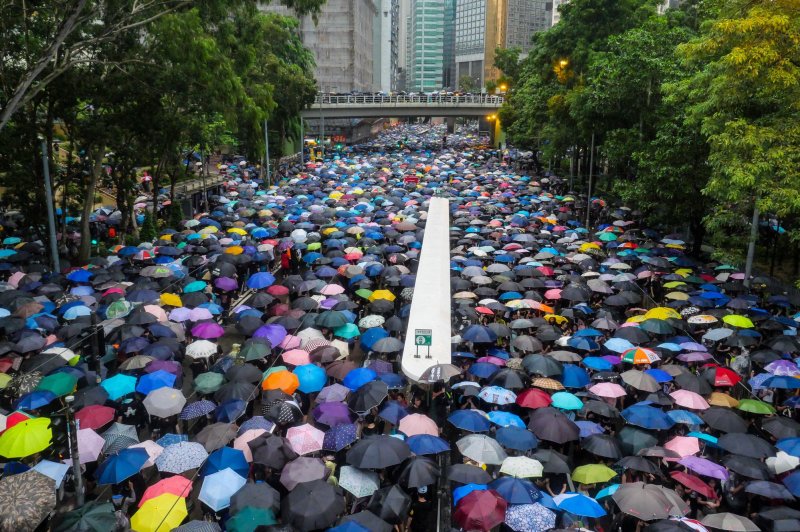A massive crowd of protesters under umbrellas leave an anti-government rally in Hong Kong's Victoria Park on August 18. Organizers estimated 1.7 million people turned out for the demonstration. Photo by Thomas Maresca/UPI |
License Photo
May 21 (UPI) -- After nearly a year of violent protests in Hong Kong, Chinese lawmakers on Friday are set to pass sweeping national security laws that threaten the autonomy of the region, attracting the ire of the United States.
Chinese state-run media Xihuannet reported Thursday that the Communist government plans submit to the 13th National People's Congress for deliberation legislation that aims to safeguard national security.
NPC spokesman Zhang Yesui described the law as "highly necessary" during a press conference, stating it was in the fundamental interest of all Chinese, including Hong Kong citizens.
"Safeguarding national security serves the fundamental interests of all Chinese, our Hong Kong compatriots included," Zhang said. "The Hong Kong [Special Administrative Region] is an inseparable part of the People's Republic of China."
Chinese government mouthpiece Global Times described the legislation as "an overdue remedy" that will close legal loopholes and prevent "internal and external forces from using the region as a tool or creating situations that threaten national security."
However, opponents see its banning of seditious acts against the central Beijing government and bypassing the Hong Kong legislature as the end of the One Country, Two Systems governmental framework that affords Hong Kong freedoms the mainland does not enjoy, which it has functioned under since returning to Chinese rule from Britain in 1997.
Prominent Hong Kong activist Joshua Wong said via Twitter the new law will allow Beijing to impose China's "draconian laws" upon Hong Kong without legislative scrutiny, describing it as "scrapping its promise of One County, Two Systems."
Protests erupted in Hong Kong starting last summer over a now-withdrawn extradition law that would have allowed for Beijing to remove some fugitives from the region to face Communist courts on the mainland. Opponents viewed it as a stripping away of freedoms they're afforded under the governmental framework.
The law was eventually repealed after protests grew to encompass larger pro-democracy issues following reports of police using excessive force against protesters.
Wong said the new law will have disastrous consequences for foreign journalists, academics and human rights organizations, which China has blamed for fueling the protests.
"The implication for all foreign organizations & investors is deadly dangerous since this arbitrarily defined law targets any ties with foreign bodies & organizations," he said, vowing that protests will continue.
"HKers will not scare off in the face of wolf warrior policies on HK," he said. "We will continue our international advocacy & tell the truth of China's authoritarianism to the world! Deep down HKProtesters know, we insist on not because we are strong, but because we have no other choice."
The law is expected to further fray relations between Beijing and Washington, which have been fracturing due to Congress passing legislation in support of the protesters last year and the Trump administration accusing China of covering up its initial response to the coronavirus outbreak, which grew into a pandemic.
The U.S. State Department on Thursday accused China of reneging on commitments to the citizens of Hong Kong by introducing this law.
"Any effort to impose national security legislation that does not reflect the will of the people of Hong Kong would be highly destabilizing, and would be met with strong condemnation from the United States and the international community," State Department spokeswoman Morgan Ortagus said in a statement, urging Beijing to adhere to commitments it made when it signed the Sino-British Joint declaration that returned Hong Kong to Chinese rule.
U.S. Secretary of State Mike Pompeo said earlier this week they have delayed presenting a report assessing Hong Kong's autonomy to Congress to see what occurs at China's parliament session this week, with this law expected to play heavily on whether the United States continues to grant special trade status to the region.
"Our decision on whether or not to certify Hong Kong as having a high degree of autonomy from China is still pending," Pompeo told reporters Wednesday. "We're closely watching what's going on there."
Following the law's announcement, Sen. Josh Hawley, R-Mo., introduced legislation to call on the international community to stand in opposition of the Chinese Communist Party's "campaign to destroy Hong Kongers' basic liberties and human rights."
"We must stand up to China's continued imperialism, and if the Beijing government goes through with this, then we need to be ready to respond strongly, including by reconsidering their trade status," Hawley said in a statement.
House Speaker Nancy Pelosi, D-Calif., tweeted the move by China shows "a complete disrespect" for the rule of law.
"Beijing's announcement of yet another attempt to bring an end to the 'one country, two systems' framework in Hong Kong is deeply alarming," she said.
Asked about the move, President Donald Trump told reporters he wasn't aware of what the law was, but if it happens "we'll address that issue very strongly."















